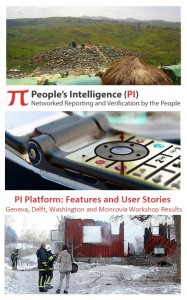Download the PI Features and User stories.
Executive Summary
In total we ran four requirements elicitation workshops to elicit the features of the PI platform and document a series of topical user stories to inform the subsequent development phase.
- In Geneva, Switzerland, on 9 and 10 October 2014 with the International Committee of the Red Cross (ICRC), the International Organization for Migration (IOM) and the United Nations High Commissioner for Refugees (UNHCR).
- In Delft, The Netherlands, on 29 October 2014 with our media partner Free Press Unlimited (FPU). The workshop was hosted by the Delft University of Technology (TUD).
- Via Skype on 5 March 2015 with Amnesty International (AI) based out of Washington DC, USA. Conflicting agendas within AI and ongoing crises made it impossible to meet in person in London as planned.
- In Monrovia, Liberia, on 19 and 20 March 2015 with the Liberian Peacebuilding Office (LPO) and civil society members of the Liberian Early Warning and Early Response (EWER) Working Group.
Features – In the course of each workshop and in following with the Agile Software Development methods we elicited a great number of features for the PI platform during short but repetitive brainstorming processes . With the help of the participants the features were regrouped and organized along the following categories:
- Dialogue for Data Collection
- Identify and Evaluate Sources
- Evaluate Information
- Verify Information
- Feedback to Sources
- Output for Organizations
- Sharing Data
- Privacy and Security
- Software and Design
User stories – Subsequently the participants were asked to define “user stories” or use cases, describing a topical use of some of the features elicited in their respective domains of intervention. These user stories are particularly useful as they allow developers to better understand the contexts in which the technology will be deployed. They also help the PI team prioritize the development of more demanded features and create value at an early stage of development. These user stories will also inform recurrent exchanges between PI’s developers and an organization’s focal points and tester in the course of the iterative development and testing phase of the PI platform. Participants defined uses of the PI platform to assist the following types of interventions:
- Family Tracing (ICRC)
- Volunteer management (ICRC)
- Camp management (IOM, UNHCR)
- Incident reports (FPU)
- Rights monitoring (AI)
- Peacebuilding (LPO, EWER)
We also discussed a series of user stories whose application span all fields of intervention:
- Syntax errors
- Unknown location
- Communication breakdown
- Informing about risks
Outcomes – So far the PI project yielded the following outcomes:
- The initiation of a discussion around the benefits and challenges of the automation of a series of critical information processes across interlocking fields of intervention (humanitarian, human rights, media and peacebuilding);
- Exchanges between organizations who often (co-)operate with or alongside one another about the opportunities and challenges of ICT solutions to manage and share information;
- The reaffirmation that ethical principles and protection standards must be at the core of any ICT solution during its entire project life-cycle starting with the requirements analysis phase, the development phase as well as during and after operational deployments of a mature solution;
- The understanding that ICT solutions are but a mean to an end among many other means, and that for all their benefits, human interactions and interventions remain of primordial importance.
Acnowledgements
We wish to thank the Humanitarian Innovation Fund who provided the necessary financial support to complete the requirements analysis of the PI platform. We also wish to tank our various partners, friends and followers without which participation and support we could not have completed our analysis of the PI requirements.


